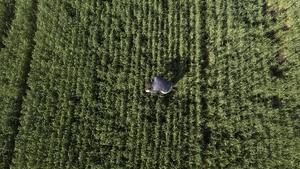 Aerial view of an Argentine farmer checking wheat crops at his farm in San Antonio de Areco, Buenos Aires province, Argentina, on Oct 13, 2018. (IVAN PISARENKO / AFP)
Aerial view of an Argentine farmer checking wheat crops at his farm in San Antonio de Areco, Buenos Aires province, Argentina, on Oct 13, 2018. (IVAN PISARENKO / AFP)
BUENOS AIRES - “Boys, from now on each one brings his own plate, knife and fork. And the mates are no longer shared.”
This grim announcement by Argentine farmer Javier Dominguez resonated strongly among employees of his farm in Lujan, Buenos Aires province, the county’s main agricultural district.
Sharing food and bitter mate tea, which is passed among clusters of friends and slurped from communal metal straws, is indispensable to the iconic image of Argentine gaucho cowboys.
ALSO READ: Trump welcomes China's efforts to help other nations amid virus
The tradition of sharing mate has been derailed as the country locks down and adopts social distancing to stem the tide of the coronavirus
That gaucho aesthetic is essential to Argentine farmers, who are Argentina’s biggest source of export dollars, forming the backbone of Latin America’s No. 3 economy.
The tradition of sharing mate has been derailed as the country locks down and adopts social distancing to stem the tide of the coronavirus. The pandemic has cost exporters in Argentina tens of millions of dollars in business so far as some mayors refuse to let grains trucks into their towns.
“There are places that do not allow truckers to go to the bathroom, they relieve themselves behind their vehicles,” Dominguez said.
Between the virus and overly wet weather that has slowed harvesting in the world’s No. 3 soy and corn exporter and No. 1 supplier of soymeal livestock feed, Argentine growers are facing disruptions that could force importers to turn toward rivals in Brazil and the United States.
“The perfect storm is brewing,” Dominguez said.
Argentina has 1,054 confirmed cases of the coronavirus with 27 deaths so far, according to official data.
“I am concerned, which is why we are following protocols, such as not letting anyone in except for those strictly related to the harvest,” said Juan Manville, a grower in northeast Buenos Aires, who apologized to Reuters for not being able to allow access to his fields to avoid risks of contagion.
In the coming weeks, as the harvest of soybeans and corn accelerates, the sight of farmers working their harvesting combines alone will become a common one.
READ MORE: WHO seeks urgent debt relief for poor nations as virus tally rises
The harvest is expected at 52 million tonnes of soy and 50 million tonnes of corn, according to the Buenos Aires Grains Exchange. Growers are bagging an increased amount of crops until pandemic- and rain-related bottlenecks clear up.
Increased storage in plastic “silo-bags” heightens the risk of spoilage when conditions are wet, adding to the uncertainties.
“I’m worried,” Dominguez said. “Everybody’s scared.”


